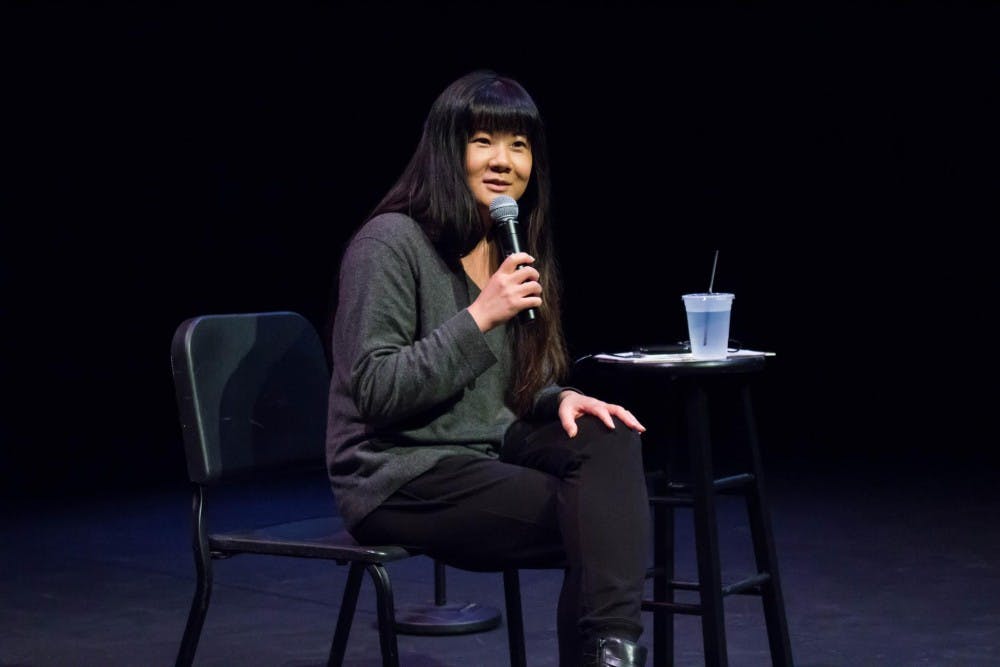Though the stage in the dimly lit theater in the Annenberg Center was set up with a lone microphone, a stool and a chair — the classic setting for a stand-up comedy act — comedian, writer and political commentator Jenny Yang said as she entered that “even though we’re in this beautiful theater, this is not stand-up — we’re going to make this a chat.”
The Penn Taiwanese Society organized the event in conjunction with Sangam and Bloomers to bring attention to under- and misrepresentation of Asian Americans in media. After briefly touching on these issues at the discussion Thursday night, Yang shifted the focus of her talk to her personal story, asking audience members to share theirs as well.
The conversation emphasized inclusivity and community building through storytelling. Yang, through watery eyes, told the audience she imagined a world in which her mother, a Taiwanese immigrant who speaks little English, could be in the position to speak to a mass of people and tell her story in her own language, as she observed a Latina woman do in Spanish when she worked in a labor movement right out of college.
“The basic building block of organizing is telling your story,” Yang said. She told the story of how her mother would come home from working in a textile factory with fibers in her snot because there was no ventilation in her workplace, and how she would work tirelessly to wring out the family’s hand-washed clothes.
Yang stressed that the most important way to build community is to not focus solely on individual success. Speaking to a room full of engaged students, Yang spoke about the mentality of getting a stereotypically “good” job to support one’s self and family, and about how that in and of itself is not doing enough for the Asian American community.
“We must push this vision of our identity that we are not out here just for ourselves,” she said. “We must lift up the marginalized voices around us as Asian Americans in order to expand our definition of who ‘we’ is.”
Yang shared that her ideas of community and solidarity were initially inspired by black women organizing at Swarthmore College, where she spent her undergraduate years.
“One particular woman ... told me that if there is something that happens with an Asian student, we will be there for you, because that’s how community works. When something happens to you, we will be there to stand up for you and when something happens to us, you will be there to stand up for us,” Yang said. “To be a community is to stand up for and communicate with each other.”
College sophomore and External Vice President of the Penn Taiwanese Society Stefanie Wang shared similar sentiments when talking about ways to effect change.
“Hopefully, we can start a conversation or debate about issues in Asian-American communities that extends beyond the communities themselves,” she said.
In addition to her call for inclusivity in community building and organizing, Yang called for everyone in the room to pursue their true passions, prompting audience members to share “what [they would] do in this world if there weren’t time, money or perception constraints.”
One student exclaimed that instead of working towards the goal of being a technology entrepreneur in San Francisco, she would own a beauty studio and produce films on minorities’ stories, to which Yang jokingly replied, “Make it happen and then fund my projects!”
Yang workshopped ideas for every student who shared, trying to explain how they could start working towards their true goals and passions in their daily lives.
“It starts from where you are,” Yang said.
Wharton and Engineering senior Scott Lee said he appreciated Yang’s approach to activism.
“What surprised me most about this event was how real it was,” he said. “Jenny gave me both personal and practical ways to go about my activism in the Asian-American community.”
“Give a vivid image of your story, and use that image to connect to other people ... What it all comes down to — it’s friendship. It’s how to be human and how to be friends,” Yang concluded before students gathered onstage to crowd in to a selfie that Yang insisted upon taking before she left.









